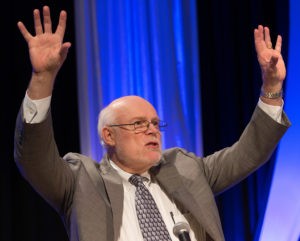Grassroots advocates are urging The United Methodist Church’s officials to make sure that those in pew and pulpit have sufficient data about a proposed new denomination to make an informed choice concerning affiliation should an anticipated split come about.
In separate messages, clergy and laity in Zimbabwe and Pennsylvania recently voiced concerns that church officials are neglecting to assure complete information is disseminated about the options United Methodists face in proposals to split the denomination. The church’s highest legislative body, the General Conference, will gather almost exactly a year from now to consider at least two major proposals, one for splitting up the denomination and another for maintaining unity through regionalized governance.
It’s the proposal to establish a new traditionalist denomination called the Global Methodist Church that worries some observers the most.

Tendai Nyagano
Zimbabwean pastor Tendai Nyagano, in an article for United Methodist Insight, pleaded with church leaders across Africa to provide more information about the options coming before the next General Conference, which will meet Aug. 29-Sept. 7, 2022, in Minneapolis.
“At this very moment, few clergy members in our conferences across Africa understand what is really going on in the UMC,” Nyagano wrote. “We are talking of the ordained elders in the church who are unaware of what is going on. Worse still, only a handful of our laity are aware of the wind of change that is approaching. Lack of information spells disaster for Africa because the few who are knowledgeable may take advantage of the situation to manipulate innocent church members.”
The Zimbabwean pastor contends that the delay in holding General Conference caused by the coronavirus pandemic gives the African UMC “a blessing in disguise.”
“The delay gives Africa a chance to disseminate correct information of what is going on in the UMC to her membership in its entirety right down to the grassroots,” Nyagano wrote. “It is every member’s right to know the truth of what is going on in the church.”
Almost simultaneously, but unconnected to Nyagano’s plea, three churchmen in the Western Pennsylvania Annual (regional) Conference released a detailed analysis comparing the current United Methodist Book of Discipline with the Transitional Book of Doctrines and Discipline of the proposed Global Methodist Church. The GMC, as it has become known, is being developed by an unofficial traditionalist caucus, the Wesleyan Covenant Association.
“It is every member’s right to know the truth of what is going on in the church.”
Seminary scholar David Morse, pastor William Gilligan and layman Tracy Merrick said in an interview that they combined forces on their analysis after discovering that most of the clergy and laity in their region knew virtually nothing about the proposed denomination beyond its rejection of LGBTQ persons. Their document has a title reminiscent of the pamphlets popular in the time of Methodism’s founder, John Wesley: “Some Notes and Reflections on The Transitional Book of Doctrines and Discipline of the Global Methodist Church Comparing and Contrasting with The Book of Discipline of The United Methodist Church (2016).”
All three authors are active in the Reconciling Ministries Network, an unofficial organization of individuals, churches and groups advocating full inclusion of LGBTQ persons in the UMC. However, the analysis was an independent effort of its authors, not an official Reconciling Ministries project, they said.
Walter Fenton, vice president of strategic engagement for the Wesleyan Covenant Association, said his organization had no comment on the analysis from Western Pennsylvania. The WCA has been promoting the Global Methodist Church through blog posts from its leaders, most often from Fenton and WCA president Keith Boyette, a retired pastor in Virginia.
Like Nyagano in Zimbabwe, Morse, Gilligan and Merrick say their goal is to provide United Methodists with fuller information about the Global Methodist Church and the implications of its proposed rules for congregations and annual conferences that may choose to affiliate with it. The authors prepared a summary of their detailed comparison chart in which they identified three major concerns about the GMC’s rule book:
- Its Traditionalist theology based on an unexamined embrace of “classic” Christian doctrines.
- Provisions intended to ensure strict adherence to the Traditionalist theology, policies and practices “as defined within the document.”
- A narrow view of inclusion, beginning with its definition of inclusiveness: “Inclusiveness denies every semblance of discrimination on the basis of race, color, national origin, disability or gender … .”
Of the three main themes, the authors said they were most concerned about the high level of authoritarian control shown in the GMC’s rule book.

Tracy Merrick (UMNS)
“There are efforts in the book to make sure everyone adheres to GMC doctrine and practices,” Merrick said. “There are swift action steps described for removing a church, pastor, layperson or bishop that doesn’t conform to GMC doctrines. And there’s no appeal to the removal.”
Morse said he found the GMC’s rule book sets up a closed theological system.
“I characterize theologies from open to closed,” explained Morse, who served for many years as coordinator of Wesleyan studies at Pittsburgh Theological Seminary. “The assumption is that if you just read the classic doctrines you’ve got (Christianity). In the United Methodist Church, we have a theological process outlined in our Book of Discipline that’s rooted in John Wesley’s method of Scripture, tradition, reason and experience interacting in a conversation.”

William Gilligan
Gilligan, who serves as pastor of Nixon UMC in Butler, Pa., 35 miles north of Pittsburgh, said he was most concerned about the potential effect of the GMC’s rules on smaller, more rural congregations like his.
“Our congregation knows where I stand as a Reconciling United Methodist, and I know where they stand,” Gilligan said. “Under normal circumstances pre-COVID, we’d have gone with the GMC. Now if they would go with GMC, I’m convinced they’d end up closing because they wouldn’t get the kind of support for ministry that the UMC provides. That’s the scariest piece to me.”
The support to which Gilligan refers involves the United Methodist system of assigning pastors to churches through appointments by the bishops of each conference. Each ordained elder in the UMC is guaranteed an annual appointment. Assisted by other officials known as district superintendents, a bishop annually appoints pastors to congregations according to an analysis of the ministry needs of each church. While consultation with congregations on a pastoral appointment does take place, churches can find themselves receiving a pastor whose views on Scripture and tradition may differ widely from a congregation’s historic theology. Low-income churches also can receive financial support from an annual conference to pay a pastor’s salary.

David Morse
Morse noted the role that the United Methodist appointment system played in his own ministry.
“In the GMC, I wouldn’t have been able to serve the churches I’ve served because of my outspoken views,” Morse said. “In the UMC, I have the freedom to create the point-counterpoint, to have that ‘otherness’ that harks back to Wesley’s concept of growth and sanctification. Clearly in the GMC prophetic ministry has been removed.”
The main themes of their analysis are only part of what the authors said United Methodists should study before deciding to affiliate with the Global Methodist Church.
“It’s important for annual conferences and district leaders to make sure churches are informed,” said Merrick, who served previously as a lay delegate to General Conference in addition to other leadership roles. “Bishops should be getting information out to annual conferences before they start to make decisions.”
Cynthia B. Astle is a veteran journalist who has covered the worldwide United Methodist Church at all levels for more than 30 years. She serves as editor of United Methodist Insight, an online journal she founded in 2011.
Related articles:
Now there appear to be three paths for once-united Methodists
Top-down schism plans ignore local United Methodist churches’ new reality


